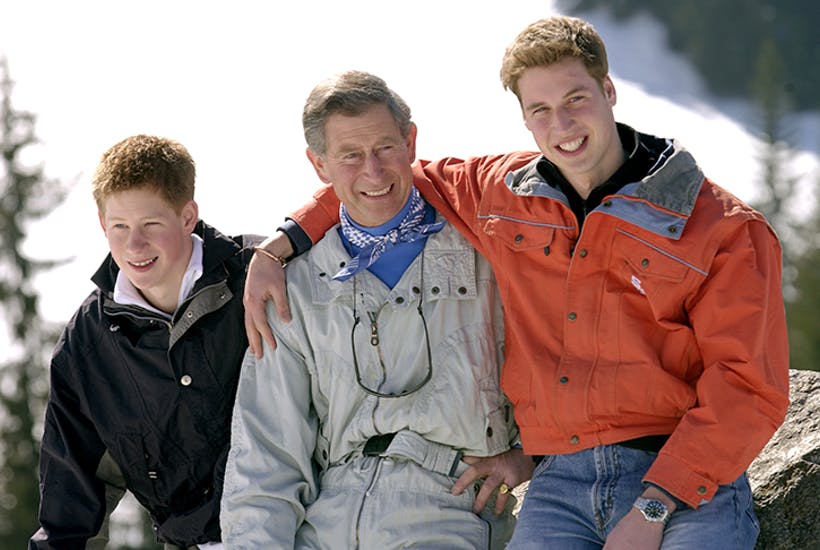Three years ago, Sir Christopher Geidt departed as the Queen’s private secretary. For years, he had done much to hold The Firm together, but his influence was resented by Prince Charles. The festering acrimony between Buckingham Palace and Clarence House came to a head in 2017 when Geidt, a Cambridge-educated former Scots Guard, convened a meeting of staff to announce Prince Philip’s retirement without first consulting Charles’s aides. Geidt ended up being forced out after a decade of unwavering service. Many in the family — including the Princess Royal and Prince Edward — now blame straight-talking Lord Geidt’s absence for the bedlam that has since ensued.
Insiders described Geidt in reverential terms, praising him as an ‘extraordinary man manager’ and ‘strategic thinker’, who unlike some of his royal ‘principals’ had the ability to ‘see around corners’ and deftly handle internal palace politics with forceful subtlety. His replacement, Sir Edward Young, while respected and liked, is said to lack Geidt’s strength of personality. So, thanks largely to her eldest son, the Queen lost the only gatekeeper who was able to keep the warring Windsors in check.
Many have questioned why, as William and Harry’s father and only living parent, Charles has not been able to broker peace between his once inseparable sons. The truth is the royal brothers do not really listen to the ‘Papa’ they have long seemed to regard with a degree of affectionate ridicule. Charles has always been desperate for the approval of his two self-confessed ‘mummy’s boys’ and so historically has had to bring in outsiders to read the riot act, such as their former joint private secretary Jamie Lowther-Pinkerton.
The brothers do not really listen to the ‘Papa’ they seem to regard with affectionate ridicule
Charles’s aides asked William to praise his father’s role in the boys’ upbringing when the brothers appeared in documentaries to mark the 20th anniversary of their mother’s death. He refused. Only Harry paid a brief tribute. Then when it came to marking Charles’s 70th birthday in November 2018, it was Harry rather than William who gave a heartfelt speech to mark the milestone at a special garden party in the summer, thanking him on behalf of the nation for his ‘incredible work’. Then in a documentary to mark the occasion, William lamented the fact that his children did not see more of their grandfather – seemingly concerned that history may repeat itself when it came to Charles’s absenteeism during his own childhood. Amid reports Kate’s parents Michael and Carole Middleton saw far more of Prince George, Princess Charlotte and Prince Louis, Charles was said to have been upset when he found out William had jokingly started referring to his father-in-law as ‘Dad’. And then there was an unfortunate incident when a never-seen-before picture of Charles holding George as a baby accidentally made an appearance in a video clip released by Clarence House to mark Earth Hour in 2015. Notoriously privacy-obsessed William hit the roof.
So for a long time, Harry was always the closer of the two sons. But the future Prince of Wales, William is increasingly being brought into his father’s decision making. He has been spending a lot more time learning about the Duchy of Cornwall (which currently funds the Cambridges and the Sussexes as well as Charles and Camilla) and was heavily involved in the decision for the Duke of York to step back from public duties over the Jeffrey Epstein scandal last November. It seems the closer William has become to Charles, the more Harry has felt pushed out.
Harry’s his own relationship with his father suffered a severe blow when, in agreement with the Queen, Charles refused to let the Sussexes set up their own ‘court’ at Windsor after they split their household from the Cambridges’ at Kensington Palace last spring. If William and Kate had their own fiefdom, why couldn’t he and Meghan? Ironically, by trying to keep them in the fold, Charles effectively gave the couple carte blanche to start operating in a silo.
The New Year release of a picture showing the Queen with her three heirs – Charles, William and George apparently only served to compound the Sussexes’ sense of sequestration.
It is certainly telling that when Charles, famed for his love of ‘black spider’ memos, demanded that Harry commit his ‘North America’ blueprint to paper, the characteristically impatient and sometimes petulant ‘spare to the heir’ went straight to granny.
At first, the Queen agreed to meet her grandson at Sandringham last Monday for talks between the two of them. But the move was blocked by courtiers close to Charles, seemingly in the belief that Harry had tried to undermine him. What looked like a peace summit was, in fact, an escalation of the feuding. Tom Bradby, the ITV news anchor who knows both royal brothers well, later revealed that Harry was not only growing frustrated with the lack of urgency, but he was fearful that any written plans might be leaked to the press. That is how bad the situation has become. A form of peace may have been reluctantly brokered at the Sandringham summit, but the feuding continues.
It is hard not to feel sorry for Charles. He is an inherently benevolent man trying to act on behalf of his mother as both future sovereign and concerned father, without either the Queen, or seemingly his sons, giving him the real authority to do so. This is the tension that now lies under the royal household, and the drama over Harry will not be the last of it.

Camilla Tominey is an associate editor at the Daily Telegraph.







Comments